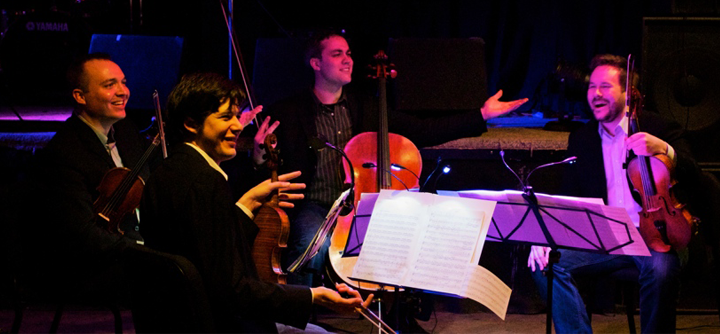
Scene from a performance. (Photo courtesy Spektral Quartet)
A Chicago string quartet is ready to rock your smartphone.
The Spektral Quartet, in its second year as the Music department’s ensemble in residence, has often commissioned composers to write them string quartets. Last year they asked their creative network to deliver something different: ringtones, alerts, and alarms that the quartet recorded for download to mobile devices.
While I was interviewing Spektral Quartet cellist and executive director Russell Rolen about the Mobile Miniatures project, I almost hoped my iPhone would ring so he could hear it. The minimasterpiece I’ve downloaded, David Lang’s “Feelings,” blows the Apple marimba out of the water.
[[{"type":"media","view_mode":"media_original","fid":"1322","attributes":{"alt":"","class":"media-image","height":"225","typeof":"foaf:Image","width":"460"}}]]
You’re serious chamber musicians. Why play ringtones?
It’s always been part of our mission to bring new music into the world, and we have a real interest in using multimedia to illuminate the music we love. We had been brainstorming for a while about how to bring together a community of many different composers for one project. I had the kernel of the idea: to see how people might imagine writing string quartet music for this gizmo we all carry around that’s a music maker.
What guidelines did you give to the composers?
We wanted the pieces to be as short as one second and as long as 40 seconds. We asked them to think about whether they’d like to write a little ditty that’s four or five seconds long and would repeat over and over, or something through composed, which means it would develop over a longer time. We suggested they imagine what type of music they’d like to wake up to on a gentle Sunday morning—or when they had to get out of bed quickly to catch a 5 a.m. flight—or what tune they’d want if it was their significant other calling versus their boss. We were delighted to see the wild range of styles, sounds, and functions that came back.
Who are the composers and how did they send you their work?
Everybody is someone we’ve already known or worked with on some level, or a friend of a friend. We started asking for submissions and just kept asking because we realized that even if we got 30 composers on board, that was still only 15 minutes of music. We ended up with 47 composers. The majority sent us a PDF using notation software; most are not even a page long.
Shulamit Ran, a UChicago music professor, wrote a suite of 13 ringtones. What’s the story there?
It was a wonderful surprise. She wrote to us as the deadline was approaching and said, “I started writing and I had one idea after another. It was like eating potato chips—you can’t just have one. Do with them what you will.” Of course we thought, “If someone like Shulamit Ran is going to write us 13 pieces, we’re going to play all 13." They’re beautiful. They all have this wonderful quality of evoking a mood instantaneously. When you hear the music you don’t want to answer your phone; you just want to let it keep playing.
How did you rehearse and record the pieces and translate the sound quality to a phone?
Our process as a quartet was to play them as well as we could, to treat them like the legitimate pieces of music that they are. We want to perform them live and have them stand on their own as miniature pieces of music. There’s a long tradition of people composing miniatures or aphorisms, like Anton Webern, an expressionist composer in the early 1900s, and Robert Muczynski, who was on the music faculty at DePaul.
We want them to sound as good as they possibly can. With the tiny speakers on the phone, the bass frequencies roll off very quickly and the music can sound tinny, fake, or metallic. Our talented engineer, Dan Nichols, spent a lot of time in postproduction tailoring the equalization settings to be optimized for the phone.
Do you have any favorites?
I like so many of them. I love Shulamit Ran’s tune “Quicksilver.” It’s so bright, energetic, and optimistic. The one I have on my phone at the moment as a ringer is by Tyshawn Sorey. I like it because it’s both attention getting and subtle. There’s one that I find kind of funny by Katherine Young, a Chicago composer. It’s very odd; all the strings are playing just for a second, sliding in different directions as you hear someone say, “Hey!” It’s a little moment you can use for a text message or e-mail alert.
What’s the reaction been so far?
Great. We’ve gotten a good number of downloads. Whenever people place an order I get an e-mail, and seeing the different combinations that people choose is delightful. I got an e-mail the other day from some woman in Sydney, Australia, who was excited to have [University Professor] Augusta Read Thomas on her phone.
Music by these composers is normally played in concert halls. We’re hoping that this project gets the music out into the world in a different, public way, where people will be exposed to it in their daily lives and it perks their ears up and starts a conversation. Maybe they’ll see it on the web, click through, explore these composers’ music, and find something they like. It gives people an entry point into the music we’re making.
Upcoming events
May 10: The Spektral Quartet will present “Counterpoint,” a sampler concert of contemporary and classical music, in Fulton Recital Hall.
May 14: The Spektral Quartet will host a release party for their new album, From This Point Forward, at Chicago's City Winery.
Audio
On April 3, the string quartet offered live renditions of the mini masterpieces at Fulton Recital Hall, as well as iPad listening stations that allowed guests to explore the full catalogue of ringtones. Spektral Quartet’s cellist and executive director Russell Rolen took a break from the festivities to discuss the project.
